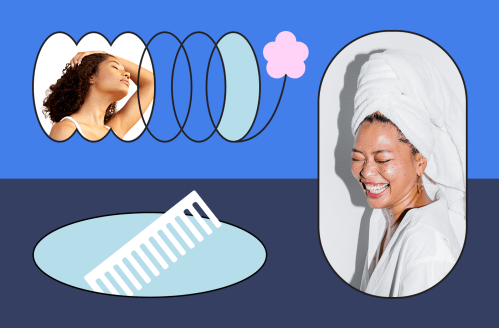There’s nothing like a bout of full-body anxiety to remind you that your psychology and physiology are seriously intertwined. You know the scenario: Something has you stressing, which makes you sweat or itch or ache, which causes more anxiety, which leads to more physical discomfort.
Examples of this “stress loop” are wide-ranging, from indigestion to insomnia. One surprising common culprit? It’s dandruff, which can flare up when you’re feeling tense. While there’s a whole host of factors that can cause both stress and dry scalp, their symptoms do exacerbate each other—and that cycle can feel frustratingly unbreakable.
Spoiler: It’s not. According to psychologist Sanam Hafeez, PsyD, reducing your stress may actually help improve your dry scalp. And according to dermatologist Jenny Liu, MD, FAAD, tending to your dandruff (with the help of tried-and-true products you can snag from Walgreens, such as Head & Shoulders) may help lower your stress-ometer by increasing your sense of confidence and self-esteem.
Dr. Hafeez and Dr. Liu share the scoop on what starts this whole stress loop, and how managing one condition can help you alleviate the other—ultimately breaking through that frustrating cycle.
Keep reading to learn about the stress-dandruff cycle—and how to get out of it.
Shop Dandruff Solutions at Walgreens

Head & Shoulders Clinical Strength Dandruff Defense $12

Head & Shoulders Classic Clean Anti-Dandruff Shampoo $7

Head & Shoulders Dry Scalp Care Anti-Dandruff Shampoo $7
The stress-dandruff connection, explained
Okay, so how does this case of chicken-or-the-egg actually play out? To take a step back, here’s a quick refresher on the fundamentals of dandruff and stress.
“Dandruff—or [its] medical term seborrheic dermatitis—is a common inflammatory rash that can have a wide range of presentations: from simple flaking to extensive redness, itching, or a yellow greasy scale,” Dr. Liu says. “Aside from the physical appearance and effects on one’s mental health and physical well-being (self image, self esteem, etc.), there have been reports that stress can flare seborrheic dermatitis, as cortisol can feed into an inflammatory response.”
Yep, studies have shown that stress can induce inflammation in the body—and dandruff is one example of an inflammatory response.
On the other hand, the physical discomfort and emotional insecurity of a flaky scalp can be totally stress-inducing. “The mental state of anxiety can increase the production of stress hormones,” Dr. Hafeez says. “Your emotional state can make the physical issues you already have worse.” And thus, the stress-dandruff cycle begins.
The bottom line? “Stress and anxiety correlate with skin conditions, but some skin conditions are exacerbated by stress and anxiety,” Dr. Hafeez says. “This is a vicious cycle where the more someone has a particular skin condition, the more stressed they become.” And the more stressed you are, the worse your skin conditions may become, she says.
How to break the cycle
So how do you put an end to it? The first step, according to Dr. Hafeez, is searching for the source of your symptoms.
“Step one is recognition,” she says. “Identifying patterns of what triggers your stress is the key to managing it.” Then, you can challenge your thinking around that trigger, she says, as often our anticipation of a situation induces more stress than the situation itself. “We often create our own trap by worrying about the weather [or] traffic, which we have no control over,” Dr. Hafeez continues. “Seizing control of what we can and accepting what we can’t will reduce our stress levels.”
One thing you definitely can control? How you remedy your scalp. For flake and itch relief, Dr. Liu opts for products with key anti-inflammatory ingredients such as selenium sulfide, which you can find in Head & Shoulders’ Clinical Strength Dandruff Defense Collection.
The line of shampoos, conditioners, and targeted scalp treatments rely on selenium sulfide for a clinical-level, flake-fighting formula that’s gentle enough for daily use, no matter your hair type.
If clinical strength isn’t your speed, Head & Shoulders Classic Clean and Dry Scalp Care collections are formulated with pyrithione zinc (another go-to ingredient on Dr. Liu’s list). The ingredient’s antibacterial and antifungal properties fight yeast growth, which is a main factor in dandruff. Try Classic Clean for a fresh scent and soothed scalp, or go for Dry Scalp Care if extra moisture (hello, almond oil) is what you’re after.
To give your scalp the most love, lather up with your chosen shampoo and pause for five minutes before rinsing, Dr. Liu says. This gives the ingredients time to activate. And during those extra moments? Try addressing your stress with meditation or a gratitude practice… or by belting out a shower tune or two.
Want to learn more about loving your scalp? Get the scoop from Head & Shoulders, and stock up on products at Walgreens.
Sign up for the Well+Good SHOP Newsletter
Get exclusive deals on wellness, beauty, fitness, and food products that have been hand-picked by our editors.
Got it, you've been added to our email list.





